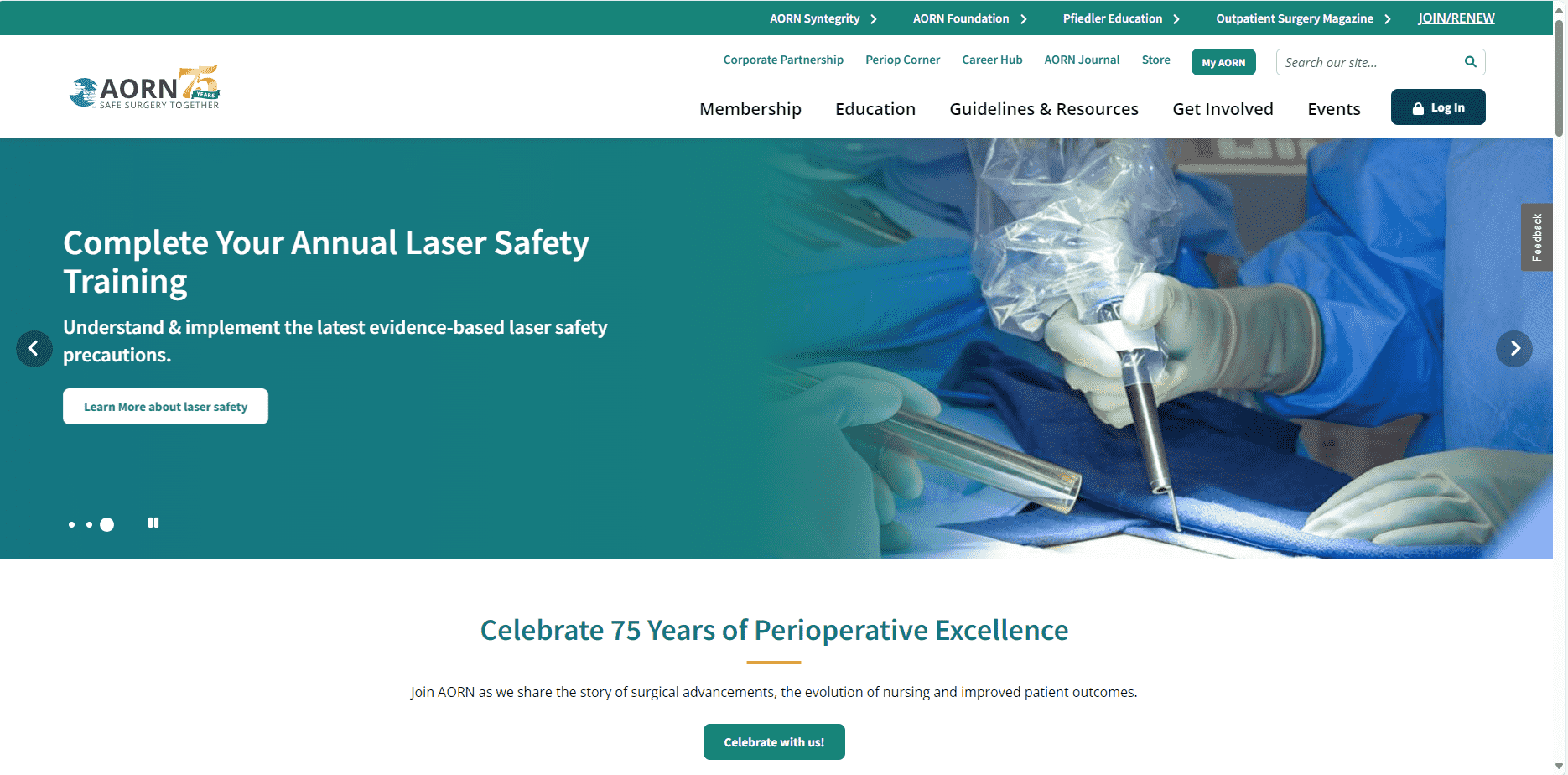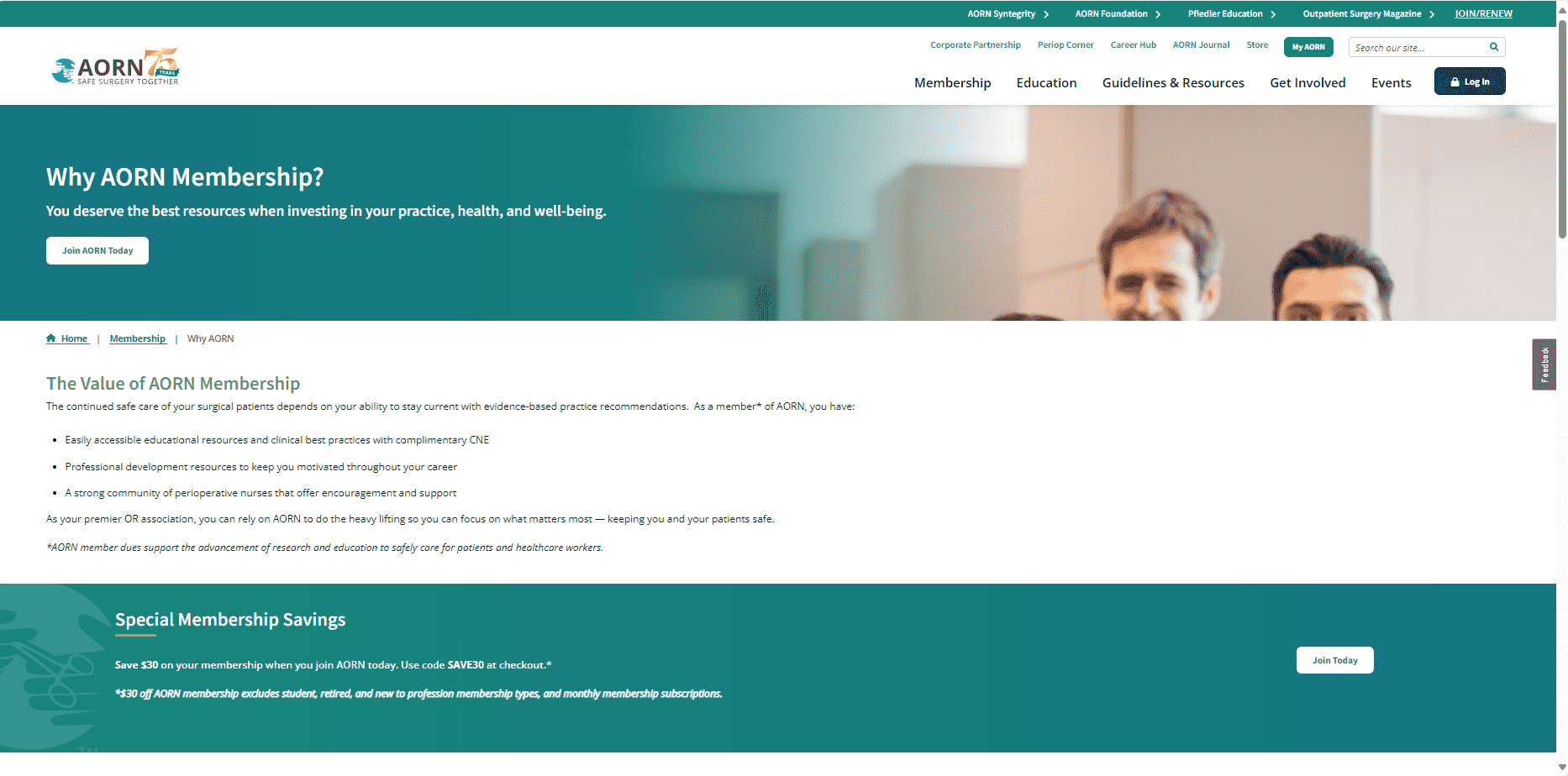AORN
Services we provide:
- Digital strategy
- Website data tracking & analysis
- Website design & development
- Progress Sitefinity implementation
About AORN
AORN is the Association of periOperative Registered Nurses, a community that started in 1949 in order to share best practices for operating room nurses. AORN is celebrating 75 years of being the largest family of organizations dedicated to supporting nurses and surgical teams with over 44,000 members nationwide. AORN shares information with its members through their digital assets, including the website. AORN came to the experts at SilverTech wanting a new digital member experience across all the AORN websites.
The Process
SilverTech’s strategy team reviewed the most current data from AORN and provided recommendations for enhancing components of all the websites for optimized data accuracy and clean data collection going forward. With this project, SilverTech met the challenge of moving seven websites from Sitecore to Sitefinity. Progress Sitefinity was the newly chosen platform for its ease of use, rich functionality and fully customizable features. This project required a design of seven unique styles and brands, creating widgets and content types that would accommodate their content needs for each of the seven entities. This includes the Outpatient Surgery magazine which had more than 12,000 articles. Other challenges with this project included the incorporation of ad space throughout the sites, SSO and member login functionality, custom search, scripted content migration and more.
RESULTS
HIPAA-Compliant Marketing Solutions You Should Know About
4/9/25
Disclaimer: This blog post is not legal advice. If you would like to ensure you comply with HIPAA guidelines, we encourage you to consult an attorney.
In today’s digital landscape, healthcare organizations rely on their website and marketing analytics to optimize their online presence and improve patient engagement. However, compliance with the Health Insurance Portability and Accountability Act (HIPAA) is crucial when dealing with Protected Health Information (PHI). Many common analytics tools, including Google Analytics, are not inherently HIPAA-compliant. This post explores HIPAA-compliant website analytics solutions, compliant marketing analytics tools, and ways to safeguard Google Analytics to mitigate compliance risks.
Google Analytics is widely used for tracking website traffic and user behavior, but it does not meet HIPAA requirements out of the box. Google does not sign a Business Associate Agreement (BAA) for Google Analytics, which is a critical requirement for HIPAA compliance. And, because Google Analytics collects and stores data, including IP addresses and user interactions, it could inadvertently include PHI.
Due to these factors, healthcare organizations should seek alternative HIPAA-compliant analytics solutions for tracking website and marketing performance.
HIPAA-Compliant Website Analytics Solutions
For healthcare organizations looking to analyze website performance while maintaining HIPAA compliance, the following solutions provide secure alternatives:
- Piwik PRO provides a HIPAA-compliant analytics solution that allows organizations to monitor website traffic while maintaining full control over sensitive data. We’ve listed this option first for a reason – it has become a leader for many healthcare networks for its all-in-one analytics solution that is also reasonably priced compared to the others on the market.
- Siteimprove offers a privacy-first approach to website analytics, ensuring compliance with HIPAA and other regulations such as ADA (Americans with Disabilities Act). It allows healthcare organizations to track user engagement without risking the exposure of PHI. And because it has features around scanning for ADA compliance as well as data insights related to SEO (search engine optimization), it often can serve as a more all-in-one solution for website and marketing analytics. This also means the cost can run higher than other solutions.
- PostHog is an open-source analytics platform with self-hosting options, but it is not inherently HIPAA-compliant unless strict self-hosting configurations are implemented. For healthcare organizations handling PHI, it's necessary that these proper safeguards are put into place. At a base level, PostHog is free but gets pricey as you scale up and pay for the enhanced features needed for HIPAA compliance.
- Freshpaint acts as a bridge between Google Analytics and HIPAA compliance. It ensures that PHI is not sent to Google’s servers by intercepting and processing data before it reaches Google Analytics. This allows organizations to use Google Analytics while maintaining compliance. If internal teams are accustomed to using the Google Analytics platform and prefer to maintain continuity in evaluating data while keeping historical records within a single system, Freshpaint offers the advantage of enabling compliance without requiring a switch to an entirely new analytics solution.
While there are other website analytics solutions, the three mentioned above are the most common. Each one has various advantages and disadvantages such as their overall capabilities, ease of implementation, and cost that your unique organization can weigh depending on your specific needs.
HIPAA-Compliant Marketing Solutions
Beyond website analytics, marketing analytics tools must also comply with HIPAA when handling PHI. The following solutions offer compliant options:
- CallRail provides HIPAA-compliant call tracking and analytics solutions. It helps healthcare organizations measure marketing effectiveness by tracking phone calls without compromising patient privacy.
- Programmatic advertising platforms such as AdTheorent and StackAdapt offer more enhanced solutions for advertising in the healthcare space while maintaining HIPAA compliance. Unlike Google Ads, programmatic vendors can use their predictive advertising platform that ensures compliance with HIPAA by using non-identifiable, privacy-safe data to target healthcare audiences effectively. While most healthcare organizations can still run ads in Google, it is limited (such as the inability to run retargeting campaigns), making your ability to reach the most relevant audience tricky.
Safeguarding Your Website Analytics
Ultimately, we recommend any organization within the healthcare space utilize a HIPAA compliant solution such as the ones mentioned above. However, if any organization, regardless of its industry, chooses to use Google Analytics, there are safeguards you can put in place to help reduce risks and while these alone do not make Google Analytics compliant, they are good practices for organizations that want to safeguard their data.
- By utilizing server-side Google Tag Manager (GTM) implementation, organizations can control and filter data before it is sent to Google Analytics. This prevents the transmission of PHI while still allowing for valuable analytics insights.
- Organizations can also configure settings within their Google Analytics property to exclude or redact any PHI that is inadvertently collected. Consult Google’s support article for more information and instructions for configuring it with your data stream.
- To prevent accidental PHI exposure, organizations should exclude the Google Analytics tracking pixel from firing on potentially sensitive pages, such as location pages or pages containing forms.
Conclusion
Although Google Analytics is a widely used platform for website analytics, it lacks built-in HIPAA compliance. As a result, healthcare organizations should consider alternative solutions that offer more secure and regulatory-compliant marketing data. By prioritizing HIPAA-compliant analytics strategies, healthcare organizations can effectively track and optimize their digital presence while ensuring patient privacy and regulatory compliance.
Unsure what marketing tools and strategies to use or how to implement them? Our experts at SilverTech have worked extensively with our healthcare clients to transform their digital strategies.




